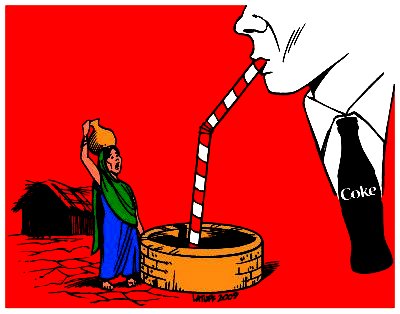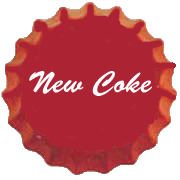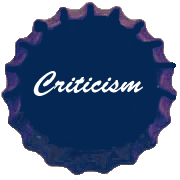Health effects
Acidity and tooth decay
Numerous court cases have been filed against the Coca-Cola Company since the 1940s alleging that the acidity of the drink is dangerous. In some of these cases, evidence has been presented showing Coca-Cola is no more harmful than comparable soft drinks or acidic fruit juices. Frequent exposure of teeth to acidic drinks affects the likelihood of tooth decay through caries development.
High fructose corn syrup
High fructose corn syrup was rapidly introduced in many processed foods and soda drinks in the US over the period of about 1975–1985. Since 1985 in the U.S., Coke has been made with high fructose corn syrup instead of sucrose to reduce costs. One of the reasons this has come under criticism is because the corn used to produce corn syrup often comes from genetically altered plants. Some nutritionists also caution against consumption of high fructose corn syrup because of possible links to obesity and diabetes. High fructose corn syrup has been shown to be metabolized differently than sugar by the human body.
This causes problems with Coke's distribution and bottling
network, because specific franchise districts are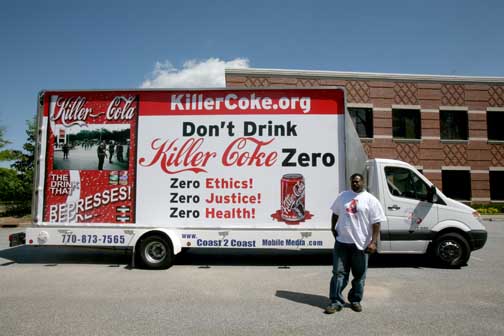 guaranteed an
exclusive market area for Coke products. Mexican-made Coca-Cola
may often be found for sale in stores catering to the Hispanic
immigrant community. Kosher for Passover Coke is also made with
cane sugar, rather than corn syrup, due to the special dietary
restrictions for observant Jews. Some Orthodox Jews do not
consume corn during the holiday. Bottled with yellow caps, this
variant can be found in some areas of the US around April.
guaranteed an
exclusive market area for Coke products. Mexican-made Coca-Cola
may often be found for sale in stores catering to the Hispanic
immigrant community. Kosher for Passover Coke is also made with
cane sugar, rather than corn syrup, due to the special dietary
restrictions for observant Jews. Some Orthodox Jews do not
consume corn during the holiday. Bottled with yellow caps, this
variant can be found in some areas of the US around April.
Business practices
Colombian trade union SINALTRAINAL called for an international boycott of Coca-Cola products because of intimidation, kidnapping and murder of workers in Coca Cola bottling plants by paramilitaries who were acting on behalf of the Coca Cola Company in order to drive down wages in Colombia. With the help of the United Steelworkers of America, SINALTRAINAL filed a lawsuit against the Coca Cola Company (Sinaltrainal v. Coca-Cola). On March 31, 2003, the United States District Court for the Southern District of Florida dismissed charges against The Coca-Cola Company because the alleged wrongdoing either occurred in the United States but was too removed from the injury or occurred abroad but did not have a substantial origin within the United States. Judge Jose E. Martinez allowed the case to go forward against two Coca-Cola bottlers: Bebidas y Alimentos and Panamerican Beverages, but not against Coke itself. On September 4, 2006, Judge Martinez dismissed the remaining claims against the two bottlers.
SINALTRAINAL lawsuit
Following two years of negotiations with Coca-Cola HQ in Atlanta, the Bigio family, living in Canada, filed a lawsuit against Coca-Cola on April 21, 1997 in the United States District Court for the Southern District of New York (Foley Square) Case #97-CV-02858. The suit alleges Coke knowingly purchased Bigio family property in Egypt after the Egyptian government illegally seized it from them in the 1960s because they were Jewish. The suit was filed in US federal court under the Alien Tort Statute, which gives non-US citizens the right to sue in US courts for alleged violations of international law. The case may be the first of many court battles in the United States brought by Jews seeking to recover confiscated property from Arab countries. "At a minimum, a private corporation that acts in concert with a foreign government is liable for violations of international law," asserted Grant Vinik, a Washington, DC attorney who, along with Nat Lewin, is representing the Bigio family.
The Bigio Family
Starting in 1938, the Bigio family factories in Egypt were licensed by Coca-Cola to produce several products such as bottle caps. In addition, Coca-Cola had a bottling plant on property it had rented from the Bigios. In 1962, the government of Gamal Abdel Nasser confiscated the land and factories, transferring it to state-owned companies. "When we left Egypt, we left with $5 each," said Bigio. After Nasser's death in 1970 privatization began, which meant state-owned property could be sold to private bidders in 1993. In 1994 the Bigios warned Coca-Cola not to proceed with the acquisition of the property without compensating the family. Coca-Cola went ahead with that acquisition in 1994 without compensating the Bigios. "They [Coke] knew they were buying nationalized and stolen assets," Bigio charged.
Coke has argued that the case should be dismissed because the court lacked jurisdiction, and that the case was old, as the family had been expropriated of their factories and real estate assets some 25 years before.
Monopolistic
In 2000, a United States federal judge dismissed an antitrust lawsuit filed by PepsiCo Inc. accusing Coca-Cola Co. of monopolizing the market for fountain-dispensed soft drinks in the United States.
In June 2005, Coca-Cola in Europe formally agreed to end deals with shops and bars to stock its drinks exclusively after a European Union investigation found its business methods stifled competition.
In November 2005, Coca-Cola's Mexican unit - Coca-Cola Export Corporation - and a number of its distributors and bottlers were fined $68 million for unfair commercial practices. Coca-Cola is appealing the case.
Discriminatory
In November 2000, Coca-Cola agreed to pay $192.5 million to settle a class action racial discrimination lawsuit and promised to change the way it manages, promotes and treats minority employees in the US. In 2003, protesters at Coca-Cola's annual meeting claimed that black people remained underrepresented in top management at the company, were paid less than white employees and fired more often. In 2004, Luke Visconti, a co-founder of Diversity Inc., which rates companies on their diversity efforts, said: "Because of the settlement decree, Coca-Cola was forced to put in management practices that have put the company in the top 10 for diversity."
Marketing
In 1993, US investigative journalist Mark Pendergrast published For God Country and Coca Cola (ISBN 0465054684), an in-depth study of the marketing phenomenon which had made Coca-Cola synonymous with US culture.
In 2004, the British government launched a wide-ranging review into food promotion and childhood obesity. One survey found that Coca-Cola broadcasted a high proportion of their advertisements during children's television.The company removed its branding from vending machines in Scottish schools in December 2003, replacing it with a graphic of an urban scene.
World War II
Before and during World War II, Coca-Cola adopted an apparent policy of ignoring the practice of eugenics and anti-Semitism by Nazi Germany, according to a 2000 book by Mark Pendergrast. Several of Coke's top executives in Germany were public members of the National Socialist German Workers Party, commonly known as the Nazi Party. When the United States entered World War II, Coke began to represent its product in the US as a patriotic drink by providing free drinks for soldiers of the United States Army, thus allowing the company to be exempt from sugar rationing.
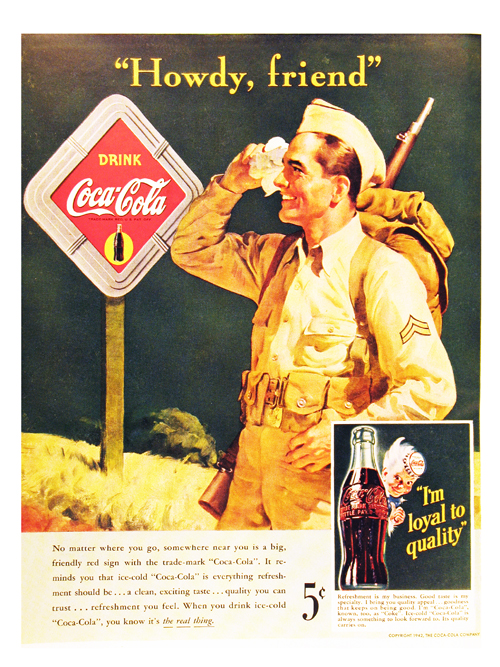 The United States Army permitted Coca-Cola employees to enter
the front lines as "Technical Officers" when in reality they
rarely if ever came close to a real battle. Instead, they
operated Coke's system of providing refreshments for soldiers,
who welcomed the beverage as a reminder of home. As the Allies
of World War II advanced, so did Coke, which took advantage of
the situation by establishing new franchises in the newly
occupied countries.
The United States Army permitted Coca-Cola employees to enter
the front lines as "Technical Officers" when in reality they
rarely if ever came close to a real battle. Instead, they
operated Coke's system of providing refreshments for soldiers,
who welcomed the beverage as a reminder of home. As the Allies
of World War II advanced, so did Coke, which took advantage of
the situation by establishing new franchises in the newly
occupied countries.
Coca-Cola set up bottling plants in several locations overseas to assure the drink's availability to soldiers, setting the stage for the company's post-war overseas expansion. The popularity of the drink exploded as US soldiers returned home from the war with a taste for the drink.
At the same time, according to Jones E and Ritzman F. in Coca Cola Goes to War, "the soft drinks giant from Atlanta, Georgia collaborated with the Nazi-regime throughout its reign from 1933–1945 and sold countless millions of bottled beverages to Hitler’s Germany."
As Nazi lines advanced, Coca-Cola corporate employees Walter Oppenhof and Max Keith, who were also hired by the Nazi's Office of Enemy Property, traveled with Wehrmacht, Stormtrooper and Schutzstaffel troops, helping to set up Coca-Cola plants in occupied territories using slave labour.
"Channel stuffing" settlement
Coca-Cola Co, on July 7, 2008 compromised to pay $137.5 million (69.4 million pounds) to settle an October 2000 shareholder lawsuit. Coca-Cola was charged in a U.S. District Court for the Northern District of Georgia, with "forcing some bottlers to purchase hundreds of millions of dollars of unnecessary beverage concentrate to make its sales seem higher." Institutional investors, led by Carpenters Health & Welfare Fund of Philadelphia & Vicinity, accused Coca-cola of "channel stuffing," or artificial inflation of Coca-Cola's results which gave investors a false picture of the company's health. The settlement applies to Coca-Cola common stock owners from Oct 21, 1999 to March 6, 2000.
Environmental issues
Pesticide use
In 2003, the Centre for Science and Environment (CSE), a non-governmental organisation in New Delhi, said aerated waters produced by soft drinks manufacturers in India, including multinational giants Pepsico and Coca-Cola, contained toxins including lindane, DDT, malathion and chlorpyrifos — pesticides that can contribute to cancer and a breakdown of the immune system. Tested products included Coke, Pepsi, and several other soft drinks (7Up, Mirinda, Fanta, Thums Up, Limca, Sprite), many produced by The Coca-Cola Company.
CSE found that the Indian produced Pepsi's soft drink products had 36 times the level of pesticide residues permitted under European Union regulations; Coca Cola's 30 times. CSE said it had tested the same products in the US and found no such residues.
Coca-Cola and PepsiCo angrily denied allegations that their products manufactured in India contained toxin levels far above the norms permitted in the developed world. David Cox, Coke's Hong Kong-based communications director for Asia, accused Sunita Narain, CSE's director, of "brandjacking" — using Coke's brand name to draw attention to her campaign against pesticides. Narain defended CSE's actions by describing them as a natural follow-up to a previous study it did on bottled water.
In 2004, an Indian parliamentary committee backed up CSE's findings, and a government-appointed committee was tasked with developing the world's first pesticide standards for soft drinks. Coke and PepsiCo oppose the move, arguing that lab tests aren't reliable enough to detect minute traces of pesticides in complex drinks like soda.
The Coca-Cola Company has responded that its plants filter water to remove potential contaminants and that its products are tested for pesticides and must meet minimum health standards before they are distributed.
Coca-Cola had registered a 11 percent drop in sales after the pesticide allegations were made in 2003.
Water use
Environmental degradation in the form of depletion of the local ground water table due to the utilisation of natural water resources by the company poses a serious threat to many communities.
In March 2004, local officials in Kerala shut down a $16 million Coke bottling plant blamed for a drastic decline in both quantity and quality of water available to local farmers and villagers.
In April 2005, Kerala's highest court
rejected water use claims, noting that wells
there continued to dry up last summer, months
after the local Coke plant stopped operating.
Further, a scientific study requested by the court found that while the plant had "aggravated
the water scarcity situation," the "most
significant factor" was a lack of rainfall.
Critics respond that Coke shouldn't be locating
bottling plants in drought-stricken areas. In
Plachimada, Coca-Cola is allegedly
responsible for creating severe water shortages
for the communities in the polluting the
groundwater and soil destroying farms by
draining them out completely. The plant here
used about 900,000 liters of water last year,
about a third of it for the soft drinks, the
rest to clean bottles and machinery. It is drawn
from wells at the plant but also from aquifers
Coca-Cola shares with neighboring farmers. The
water is virtually free to all users. These
farmers who have been protesting say their
problems began after the Coca-Cola factory
arrived in 1999.
court found that while the plant had "aggravated
the water scarcity situation," the "most
significant factor" was a lack of rainfall.
Critics respond that Coke shouldn't be locating
bottling plants in drought-stricken areas. In
Plachimada, Coca-Cola is allegedly
responsible for creating severe water shortages
for the communities in the polluting the
groundwater and soil destroying farms by
draining them out completely. The plant here
used about 900,000 liters of water last year,
about a third of it for the soft drinks, the
rest to clean bottles and machinery. It is drawn
from wells at the plant but also from aquifers
Coca-Cola shares with neighboring farmers. The
water is virtually free to all users. These
farmers who have been protesting say their
problems began after the Coca-Cola factory
arrived in 1999.
The company has been trying to regain the plant's license, fighting a case that has gone all the way to India's Supreme Court.
Near the holy city of Varanasi in northeastern India, a local water official blames a Coke plant — which has been the scene of many protests by NGOs and local residents — for polluting groundwater by releasing wastewater into surrounding land. A Coke official confirms there had been a drainage problem with treated wastewater several years ago but says the company built a long pipeline to correct it.


